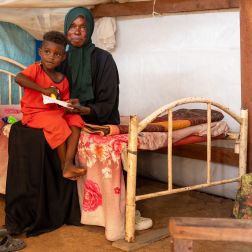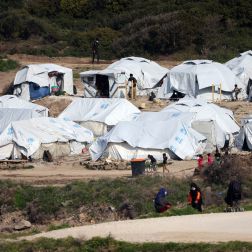- 4 mins read time
- Published: 8th July 2014
We can’t look away from the crisis in South Sudan
In a town called Kurmuk, on the eastern border with Ethiopia, I watched on in awe as refugees returned in 2006.
The trauma and hardship these people endured over more than two decades of civil war was replaced with a hope for the future and an overwhelming desire to return to their homeland.
Despite the multiple challenges the refugees knew they faced — a lack of safe clean water or physical infrastructure such as schools, hospitals and roads — I saw in them phenomenal strength and personal courage as they embraced rebuilding their land and their lives in their broken country.

It is devastating to witness yet again so many forced to flee their homes amid increasing conflict and disease in the region. South Sudan has experienced just three years of independence and already the seeds of hope sown then have turned to despair in the aftermath of violence that erupted last December.
The situation in South Sudan, the world’s newest country but where so many live in poverty, has gone beyond the forewarned tipping point, with its people now facing certain catastrophe in the months ahead.
The recent bloody conflict has left millions dependent on food aid to survive. Four million people are at risk of severe hunger. This is a humanitarian crisis of staggering proportions.

Above: Families arriving in Mingkaman after fleeing violence. Photos: Mackenzie Knowles-Coursin/Oxfam
Over 1.5m people have been forced to flee their homes, often with just the clothes on their backs, leaving behind what meagre possessions they had with no means to get food, water or other vital essentials.
Over 392,000 of refugees have fled to neighbouring countries of Uganda, Ethiopia, Kenya and Sudan lending to increased risk of regional insecurity as the spread of localised conflict in the Middle East has demonstrated.
In camps for those displaced, people are living in atrocious conditions and walking knee deep in mud and water. Poor sanitation has already taken many lives through the spread of cholera and other diseases, ever increasing with the seasonal heavy rains.
Now, many of South Sudan’s well-travelled but unsurfaced roads that form the arteries and veins of the country’s economy are left water logged and largely impassable.
The conflict has prevented people from planting seeds in time for harvest before the rains. Because of this, access to food will deteriorate even further, as access by aid agencies decreases and the risk of new peaks in fighting rise.
Oxfam is reaching out to thousands of vulnerable people with food and water but there are thousands more who need our help. We will be staring into an abyss if funds do not start arriving soon.

Clockwise from top: 7 tonnes of Oxfam aid arrives in Juba, South Sudan. Photo: Grace Cahill/Oxfam Oxfam is helping to purify 1m litres of water a day Photo: Mackenzie Knowles-Coursin/Oxfam Martha Yandt receives food at a distribution. Photo: Pablo Tosco/Oxfam
It is disappointing that while many nations pushed for and supported South Sudan’s independence from Sudan, little commitment is forthcoming from the international community in the form of aid.
The people of South Sudan need an end to the fighting, but with peace talks stalled, there is little hope of a swift end to the conflict.
We need to see a surge in the capacity of the response, which is very much dependent on funding. There must be a scaling-up of the activities of the international community to respond to this crisis.
A recent presentation by Irish aid agencies to the Oireachtas Foreign Affairs Committee resulted in cross party political acknowledgement of the scale of need in South Sudan and earnest commitment to supporting a peaceful resolution.
The international community can mirror Ireland’s diligence by increasing its diplomatic pressure on the two protagonists of the conflict, facilitating efforts to keep the situation in South Sudan on the international agenda, delivering on pledged funds to the UN appeal and deploying UN peacekeeping troops within capacity. It absolutely cannot resolve itself of responsibility.
Despite the flagging interest of news agencies, the conflict in South Sudan has not abated. The scenes of devastation may have become less visible but the suffering does not end.
The UN has warned that the worst hit areas are at risk of impending famine. We have a chance to act now to avoid the “Forgotten Crisis” becoming a crisis we cannot forget.
We need a massive and rapid global surge in aid. For the sake of our common humanity we cannot, we should not, look away at this time of crisis. Action must be taken now. The tide is already against us.
Jim Clarken is Oxfam Ireland’s CEO




